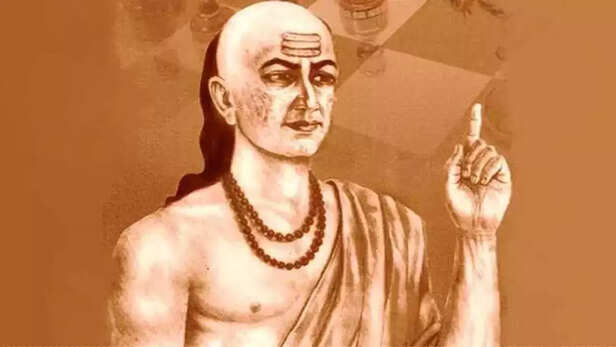6 Life-Changing Tips from Chanakya to Rise After a Fall
Nidhi | Jan 03, 2025, 17:26 IST
Discover the timeless wisdom of Chanakya and learn how to transform life's setbacks into powerful comebacks. This article dives into actionable tips inspired by Chanakya’s strategies, including resilience, adaptability, and resource management, offering a roadmap to bounce back stronger from challenges.
Setbacks—those unexpected punches life throws at us when we least expect them. They can shake our foundations and cloud our vision. But what if I told you that setbacks, when approached the right way, can be the catalyst for your most extraordinary comebacks? In this article, let’s dive deep into Chanakya’s life and philosophy to discover the unconventional yet powerful wisdom he offers for transforming failure into triumph.

Most of us think a setback is the end of the road. But Chanakya, with his unparalleled wisdom, would ask, “Is your failure truly yours, or are you letting your emotions dictate the outcome?”
Take a moment to picture this: You're a brilliant musician who faces rejection from a prestigious music school. Instead of wallowing in self-pity, what if you saw that rejection as the universe testing your passion rather than breaking it? Chanakya teaches us not to attach our emotions too tightly to outcomes. Emotional disengagement isn’t about suppressing feelings but about observing them from a distance, allowing your mind to stay sharp and your actions to stay strategic.
This philosophy echoes in the life of Steve Jobs. After being ousted from Apple, his emotional detachment allowed him to build NeXT and Pixar, which later led to his legendary return to Apple. In this way, setbacks can often clear the emotional fog and lead to a new, more refined path.
One of Chanakya’s greatest lessons is that “Conformity is the enemy of progress.” His life wasn’t about following the status quo; it was about challenging it, disrupting it, and coming out on top.
Imagine the scenario of an athlete who fails to qualify for the national team despite years of hard work. Instead of following the conventional route of quitting or feeling like a victim, Chanakya would advise “Innovate the rules”. Why stick to the same sport? Why not pivot, try a different technique, or even innovate within the sport itself?
This is exactly what happened with the story of Kiran Bedi. After facing gender-based opposition in the Indian Police Service, she didn't just sulk in defeat. She revolutionized the way police work was perceived in India, eventually becoming one of the most respected figures in law enforcement. Her setback wasn’t an obstacle but a prompt to redefine the game.

In his philosophy, Chanakya speaks about the importance of “silence”—not as a mere absence of words but as an active, strategic tool to gain influence. This is a unique concept: The silent rebel doesn’t shout in protest; they quietly set a new course of action that will render all prior setbacks obsolete.
Think of an entrepreneur whose business failed because of a toxic work environment. Instead of loudly announcing the company’s collapse and seeking validation from external sympathy, the entrepreneur silently begins crafting a new business from the ground up, one that values collaboration and empathy. No dramatic exit, no speeches—just a quiet revolution behind the scenes.
Chanakya’s version of a “silent comeback” is not about being passive, but about using silence to observe, reflect, and create a ripple effect that changes everything in the long term.

Chanakya was a master of reframing challenges into opportunities. When faced with failure, he didn’t waste energy lamenting what went wrong—he immediately reframed the situation and sought out a new opportunity within it.
Take a scene from your life: Imagine losing a job that you’ve worked hard for. Instead of lamenting over the loss, what if you reframed it as “an opportunity to redefine my career and pursue my true calling”? What if, instead of feeling defeated, you saw the redundancy as your liberation from a cycle you no longer belonged to?
This concept is best seen in the transformation of the Subway franchise. Founded by Fred DeLuca, Subway faced numerous setbacks in its early years. Instead of quitting, he saw each failure as a sign that the current model wasn’t working. Rather than fixating on the lost opportunities, he continuously adapted, eventually building a global empire. His ability to reframe setbacks as stepping stones was key to his success.
We often feel like a comeback must be immediate, but Chanakya’s wisdom suggests that sometimes, the most powerful comeback happens when you embrace the concept of a strategic retreat. This is counterintuitive—when things go wrong, we think we need to rush forward and fix everything. Chanakya, however, advocated stepping back and waiting for the right moment.
Think of a warrior, wounded in battle, retreating to gather strength and strategy. In today’s context, it’s like taking time off after a personal failure. Whether it’s a failed relationship, business venture, or creative endeavor, sometimes the greatest strength lies in allowing yourself to withdraw temporarily. Use that space for introspection, rest, and recalibration.
When Mahatma Gandhi failed to achieve immediate results in his early campaigns, he didn’t give up. He retreated to refine his strategy, only to return more powerful and influential than ever.

Chanakya was no stranger to alliances. He understood that the lone wolf doesn’t survive for long, especially when setbacks challenge the very foundation of success. But here’s the twist: His alliances weren’t always loud, public ones. Chanakya believed in forging silent alliances, connecting with those who shared his vision, even when they weren’t in the limelight.
In the age of social media, we often look for validation through numbers—likes, shares, and comments. However, a true Chanakya approach would focus on building deep, meaningful relationships that go beyond digital popularity. Sometimes, it’s about aligning with people whose work resonates with you quietly behind closed doors.
Look at the story of Tim Cook. When he took over Apple after Steve Jobs’ death, he didn’t make sweeping changes for the sake of change. Instead, he collaborated quietly, respecting the foundation Jobs built, and yet introduced subtle innovations that turned Apple into the tech giant it is today.
Chanakya’s secret sauce to turning setbacks into comebacks isn’t about playing it safe, following the rules, or waiting for the “right” time. It’s about seeing beyond the obvious, playing the long game, and using silence, strategy, and reframing to transform failure into an opportunity.
So the next time you face a setback, don’t panic. Take a moment to disengage emotionally, reframe the challenge, and embrace the unconventional path of silent rebellion and strategic retreat. The comeback you seek isn’t just about bouncing back—it’s about coming back stronger, wiser, and more prepared for the road ahead.
1. The Art of Emotional Disengagement: Chanakya’s Emotional Shield

Chanakya Niti
Most of us think a setback is the end of the road. But Chanakya, with his unparalleled wisdom, would ask, “Is your failure truly yours, or are you letting your emotions dictate the outcome?”
Take a moment to picture this: You're a brilliant musician who faces rejection from a prestigious music school. Instead of wallowing in self-pity, what if you saw that rejection as the universe testing your passion rather than breaking it? Chanakya teaches us not to attach our emotions too tightly to outcomes. Emotional disengagement isn’t about suppressing feelings but about observing them from a distance, allowing your mind to stay sharp and your actions to stay strategic.
This philosophy echoes in the life of Steve Jobs. After being ousted from Apple, his emotional detachment allowed him to build NeXT and Pixar, which later led to his legendary return to Apple. In this way, setbacks can often clear the emotional fog and lead to a new, more refined path.
2. Disruptive Innovation: Chanakya’s Call for Rebellion Against the Norms
Imagine the scenario of an athlete who fails to qualify for the national team despite years of hard work. Instead of following the conventional route of quitting or feeling like a victim, Chanakya would advise “Innovate the rules”. Why stick to the same sport? Why not pivot, try a different technique, or even innovate within the sport itself?
This is exactly what happened with the story of Kiran Bedi. After facing gender-based opposition in the Indian Police Service, she didn't just sulk in defeat. She revolutionized the way police work was perceived in India, eventually becoming one of the most respected figures in law enforcement. Her setback wasn’t an obstacle but a prompt to redefine the game.
3. The Power of Silent Rebellion: Chanakya’s Disguised Strength

Arthashastra: Chanakya
In his philosophy, Chanakya speaks about the importance of “silence”—not as a mere absence of words but as an active, strategic tool to gain influence. This is a unique concept: The silent rebel doesn’t shout in protest; they quietly set a new course of action that will render all prior setbacks obsolete.
Think of an entrepreneur whose business failed because of a toxic work environment. Instead of loudly announcing the company’s collapse and seeking validation from external sympathy, the entrepreneur silently begins crafting a new business from the ground up, one that values collaboration and empathy. No dramatic exit, no speeches—just a quiet revolution behind the scenes.
Chanakya’s version of a “silent comeback” is not about being passive, but about using silence to observe, reflect, and create a ripple effect that changes everything in the long term.
4. Turn Your Setback into a Magnet for Opportunity: The Subtle Art of Reframing

Detachment
Chanakya was a master of reframing challenges into opportunities. When faced with failure, he didn’t waste energy lamenting what went wrong—he immediately reframed the situation and sought out a new opportunity within it.
Take a scene from your life: Imagine losing a job that you’ve worked hard for. Instead of lamenting over the loss, what if you reframed it as “an opportunity to redefine my career and pursue my true calling”? What if, instead of feeling defeated, you saw the redundancy as your liberation from a cycle you no longer belonged to?
This concept is best seen in the transformation of the Subway franchise. Founded by Fred DeLuca, Subway faced numerous setbacks in its early years. Instead of quitting, he saw each failure as a sign that the current model wasn’t working. Rather than fixating on the lost opportunities, he continuously adapted, eventually building a global empire. His ability to reframe setbacks as stepping stones was key to his success.
5. Strategic Retreat: The Chanakya Principle of Temporary Withdrawal
Think of a warrior, wounded in battle, retreating to gather strength and strategy. In today’s context, it’s like taking time off after a personal failure. Whether it’s a failed relationship, business venture, or creative endeavor, sometimes the greatest strength lies in allowing yourself to withdraw temporarily. Use that space for introspection, rest, and recalibration.
When Mahatma Gandhi failed to achieve immediate results in his early campaigns, he didn’t give up. He retreated to refine his strategy, only to return more powerful and influential than ever.
6. From Isolation to Collaboration: Chanakya’s Secret of Networking in Silence

Kautilya
Chanakya was no stranger to alliances. He understood that the lone wolf doesn’t survive for long, especially when setbacks challenge the very foundation of success. But here’s the twist: His alliances weren’t always loud, public ones. Chanakya believed in forging silent alliances, connecting with those who shared his vision, even when they weren’t in the limelight.
In the age of social media, we often look for validation through numbers—likes, shares, and comments. However, a true Chanakya approach would focus on building deep, meaningful relationships that go beyond digital popularity. Sometimes, it’s about aligning with people whose work resonates with you quietly behind closed doors.
Look at the story of Tim Cook. When he took over Apple after Steve Jobs’ death, he didn’t make sweeping changes for the sake of change. Instead, he collaborated quietly, respecting the foundation Jobs built, and yet introduced subtle innovations that turned Apple into the tech giant it is today.
Embrace the Unconventional Comeback
So the next time you face a setback, don’t panic. Take a moment to disengage emotionally, reframe the challenge, and embrace the unconventional path of silent rebellion and strategic retreat. The comeback you seek isn’t just about bouncing back—it’s about coming back stronger, wiser, and more prepared for the road ahead.
